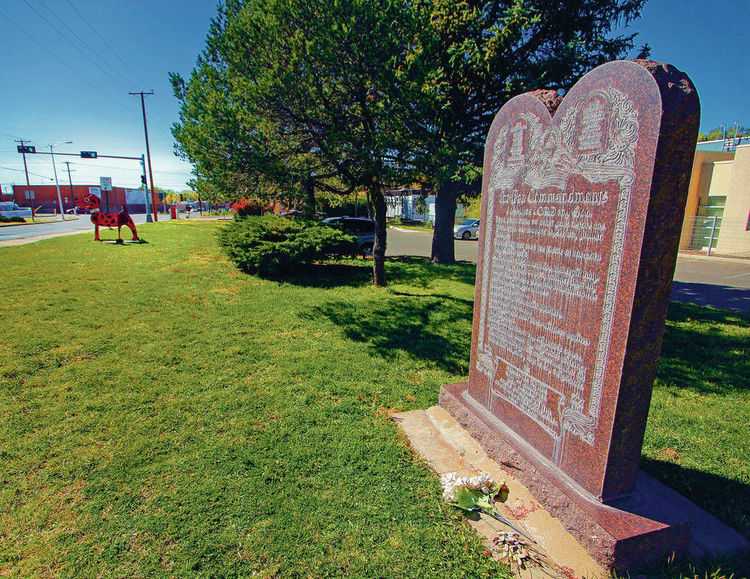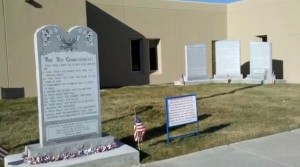
SANTA FE, N.M. — One of the nation’s most conspicuous atheist activist groups has contacted the city attorney for Santa Fe, New Mexico to assert that a Ten Commandments monument displayed in a public park adjacent to a fire station is unconstitutional and should be moved to private property.
The Wisconsin-based Freedom From Religion Foundation (FFRF) says that the six-foot monument that rests in Ashbaugh Park in front of Fire Station No. 3 should be given back to the Fraternal Order of Eagles or transferred to the grounds of a church.
“The First Commandment alone makes it obvious why the Ten Commandments may not be posted on government property. The government has no business telling citizens which God they must have, how many gods they must have, or that they must have any God at all,” wrote Co-President Annie Laurie Gaylor in the letter, dated Jan. 8.
“One the government confers endorsement and preference for some religions over others, it strikes a blow at religious liberty, forcing taxpayers of all faith and of no religion to support a particular expression of worship,” she said.
Gaylor also claimed that the 10th Commandment, which teaches men not to covet their “neighbor’s house [nor his] neighbor’s wife, nor his manservant, nor his maidservant, nor his ox, nor his donkey, nor any thing that is thy neighbor’s” offensively implies that wives and servants are a man’s “property” and “on par with cattle.”
According to the Santa Fe New Mexican, the monument was placed in 1968 by the Eagles. FFRF believes the Eagles erected the display to coincide with Cecil B. DeMille’s classic film “The Ten Commandments.”
“This monolith in front of the city fire station is little more than one big unconstitutional advertisement,” Gaylor wrote. “The simplest solution, as many enlightened governmental bodies have found, is to have the monument removed. Give it back to the Eagles or a church to display.”
City officials have not yet commented on the FFRF letter, and had said previously that no complaints had been received about the Decalogue display.
While a similar monument in New Mexico was declared unconstitutional by the 10th Circuit in 2016 and later moved to a local church, two judges on the appeals court noted that the Establishment Clause is being misinterpreted by the judicial system.

As previously reported, Judge Paul Kelly, Jr. and Chief Judge Timothy Tymkovich opined that their colleagues incorrectly concluded that the Bloomfield monument violated the Constitution.
“This decision continues the error of our Establishment Clause cases. It does not align with the historical understanding of an ‘establishment of religion’ and thus with what the First Amendment actually prohibits,” Kelly wrote.
He noted that “[e]stablishment was … the norm in the American Colonies. Exclusive Anglican establishments reigned in the southern states, whereas localized Puritan establishments were the norm in New England, except in Rhode Island.”
This began in Europe, “the continent of origin for most American colonists,” Kelly outlined. “[E]ach country had long established its own state church—a generalized version of cuius regio, eius religio—over which each government exercised varying degrees of control. Germany and Scandinavia had official Lutheran establishments; Holland, a Reformed state church; France, the Gallican Catholic Church; Ireland, the Church of Ireland; Scotland, the Church of Scotland; and so on.”
Therefore, the Establishment Clause of the U.S. Constitution regarding “respecting an establishment” only referred to these arrangements, and only applied to the federal government, not the states.
“From the words of the text, though, two conclusions are relatively clear: first, the provision originally limited the federal government and not the states, many of which continued to support established churches; and second, the limitation respected only an actual ‘establishment of religion,’” Kelly explained.
“Though this court may view the placement of the Ten Commandments as unwise, unnecessary, or even aesthetically displeasing, we should defer to local government decisions absent an actual violation of the First Amendment,” he declared.
Become a Christian News Network Supporter...


